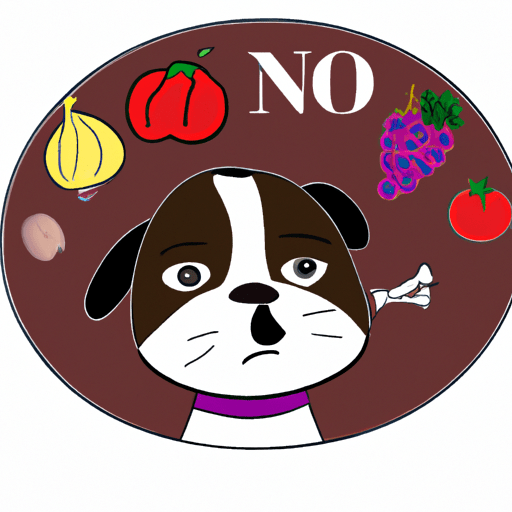As a caregiver to a furry friend, it’s important to know what foods are safe and which ones are potentially dangerous. Let’s dive into the world of canine nutrition and explore what dogs can’t eat.
1. Chocolate and Caffeine
Chocolate and caffeine are two well-known toxins to dogs. They contain substances called methylxanthines, which can cause hyperactivity, increased heart rate, abnormal rhythms, and seizures in dogs. When it comes to chocolate, the darker it is, the more dangerous it becomes.
- Dark chocolate: Extremely harmful
- Milk chocolate: Less dangerous, but still harmful
- White chocolate: Contains minimal amounts of theobromine, but can still cause gastrointestinal upset.
2. Grapes and Raisins
The exact reason why grapes and raisins are toxic to dogs remains a mystery. However, ingestion can lead to acute kidney failure. Even small amounts can be dangerous. Be cautious of foods that may contain them such as fruit salads, muffins, or granola.
3. Onions and Garlic
Onions and garlic can cause anemia in dogs. This means their red blood cells break down, leaving them with less oxygen carrying capacity. Cooking these foods does not reduce their toxicity.
4. Alcohol and Yeast Dough
Alcohol has the same effects on a dog’s liver and brain that it has on humans, but it takes far less to cause damage. Even small amounts can lead to toxicity. Yeast dough can also be dangerous as it ferments and produces alcohol.
5. Xylitol
Xylitol is a sugar substitute found in many products, including gum, candy, baked goods, and toothpaste. When dogs ingest xylitol, it can lead to a rapid drop in blood sugar and subsequent liver damage.
| Common Products Containing Xylitol | Danger Level |
|---|---|
| Gum | High |
| Candy | High |
| Baked Goods | Moderate |
| Toothpaste | Low |
6. High Fat Foods and Bones
Foods high in fat, like bacon and fatty meats, can lead to pancreatitis in dogs. Bones, particularly cooked ones, can splinter and cause obstructions or injuries in the digestive system.
7. Macadamia Nuts
Macadamia nuts are another mystery to scientists, but ingestion can cause vomiting, ataxia, hyperthermia, and depression in dogs.
8. Dairy Products
Most dogs are lactose intolerant, meaning they lack the enzymes needed to break down lactose. Consuming dairy products can lead to gastrointestinal upset, including diarrhea and vomiting.
Frequently Asked Questions
Can dogs eat chocolate or caffeine?
No, chocolate and caffeine contain substances called methylxanthines which are toxic to dogs.
Are grapes and raisins harmful to dogs?
Yes, even small quantities of grapes or raisins can lead to acute kidney failure in dogs.
Can dogs consume onions or garlic?
It is not advisable. Onions and garlic can cause anemia in dogs, leading to a decrease in their oxygen carrying capacity.
Is alcohol harmful to dogs?
Yes, even small amounts of alcohol can lead to toxicity in dogs, damaging their liver and brain.
What is xylitol and why is it dangerous?
Xylitol is a sugar substitute found in many products like gum, candy, baked goods, and toothpaste. It can cause a rapid drop in a dog’s blood sugar and subsequent liver damage.
Are high fat foods and bones dangerous for dogs?
Yes, foods high in fat can lead to pancreatitis, and bones can splinter and cause obstructions or injuries.
Can dogs eat macadamia nuts?
No, macadamia nuts can cause vomiting, ataxia, hyperthermia, and depression in dogs.
Can dogs have dairy products?
Most dogs are lactose intolerant and can experience gastrointestinal upset after consuming dairy products.
Remember, your canine companion relies on you to provide a balanced diet and to keep them safe from harmful substances. Always consult with your veterinarian if you’re unsure about feeding your dog a particular food.



